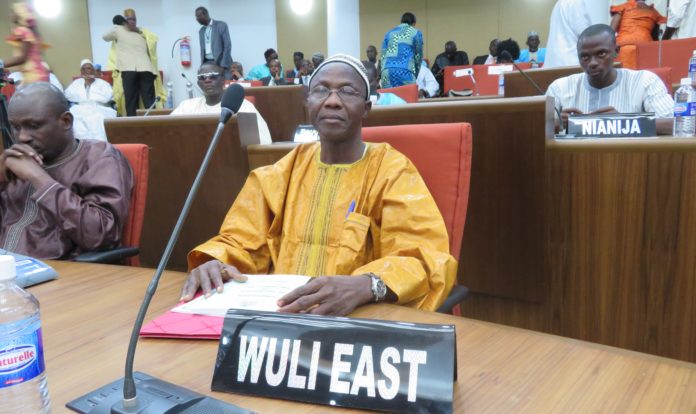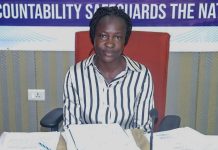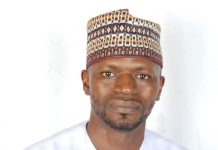By Yankuba Jallow
The National Assembly Member for Wuli East Suwaibou Touray, contributed to the adjournment debate of the just concluded First Ordinary Session of the 2018 Legislative Year.
Suwaibu said the issue of groundnut trade is very urgent for the farming community because Government encouraged them (farmers) to produce groundnuts and they were promised that all their nuts will be bought; that in his Constituency (Wuli East) huge quantities of groundnuts are stacked in hundred kilo bags; that he visited “Seccos” within the constituency and found promissory notes given to farmers for their nuts; that the burning issue with farmers in the provinces is for Government to put an end to this problem because they have lost all faith in the system.
The other issue affecting agriculture according to Suwaibu is that farmers have their seed nuts, but most of the seed stores are in serious dilapidating conditions; that they do not have a place to keep their seed nuts for safe protection from pests till cropping time. “It has been like this for the past twenty two years. There were no repairs done to some of these seed stores and as a result, most of them are not operating now. They need repairs because they are in serious dilapidating conditions. The Agriculture Ministry need to work on these stores to enable famers protect their seeds for use when the raining season commences,” Suwaibu said.
Touray said he had raised an issue with the Ministry of Energy, which is a concern for the residence of Nemakunku and Farato Madina; that there is a small community in Nemakunku which is surrounded by service poles and pipes but the community cannot still have water and electricity.
“They are seriously in need of water. As I said the last time, some residents of the area used horse / donkey carts to go to the surrounding communities to fetch water. So I will call on the Energy Minister as I did before. Minister Fafa Sanyang was not around when I made the recommendation for him to use his power or authority and urge the nation’s utility service provider NAWEC, to conduct a survey and verify this. I believe this is an anomaly because they are a settlement surrounded by water and electricity and yet they cannot have access to water and electricity; I think that is an anomaly and an oversight and it needs to be addressed,” he said.
On the issue of the crises engulfing the Health Ministry, Suwaibu Touray said the situation has taken too long and is getting out of hand; that patients who are now referred to Edward Francis Small Teaching Hospital, are not attended to; that information received was that no single Doctor will be at the Hospital in Banjul on Tuesday. Suwaibu said it is important for the authorities to constructively engage the striking doctors to put the strike that is causing harm to the Gambian people, to an end.
Suwaibu also said the issue of National Identity Cards need to be addressed now; that they (members of the National Assembly), were told that bidding was opened; but that up to now, the situation has not been addressed. “Who will be given the contract is not important to me. What is of essence is that work on our National document should now commence to provide this vital, most important document to the citizenry,” he said.
He said there is a local issue in Basse; that the electricity has been connected to Senegal but there are certain times in the morning when there is no electricity; that as a result the local Radio (GRTS), does not operate in the morning because of lack of electricity; that there was an individual who was helping them with fuel but after a while, this has stopped due to some issues of corruption on the misuse of fuel. He urged the Ministers of Energy and Information, to look into the issue.
Suwaibu told deputies during the adjournment debate that they are public servants; that they are public officers but that they have demarcations regarding their portfolios; that a National Assembly Member cannot serve as a Minister and / or vice-versa.
“What is important is that we should all know our limitations,” he said. “When you come to the media, which is very crucial, people are talking about social media. We need to be able encourage them to take constructive lines but at the same time, public officers must guard their fences in terms of utterances. Of recent, we have experienced the utterances of a public officer in and outside this National Assembly. This did not go down well until some apologies have to be made on behalf of Government,” he said.
“We all need to guard our utterances so that we will be able to know what we have to say, at which time to say it and where. So I am urging everyone to be able to know at each given state, what you should or not say to the press, no matter how pressed the person is,” he concluded.
In his contribution, Sidia Jatta, the Member for Wuli West said it is an obligation for Ministers to come to the National Assembly; that he does not need to make reference on this because it is clearly stipulated in the Constitution; that the importance for Minister’s appearance is to provide an occasion for them, for cabinet and the legislature, to put heads together with a view to sharpen their policies; that this is an obligation on them, particularly during adjournment debates.
“I will never speak again during adjournment debate if there is no Minister and if there is a Minister, I will only talk about matters relating to his or her portfolio Finish! I will not give responsibility to other Ministers because it is unfair,” Sidia asserted.
“I found the attitude of some Ministers to this Assembly very wanting. For example, since the last Session, questions were posed and they were not answered. It was only five questions just before the retreat at Tendaba. Only one question was answered and the others were not. Again with this session, I asked five questions and only two were answered, and the rest I know, will not be answered. I am not the only one,” he said.
He said the question that are asked are not done for the sake of just asking, but to help shape certain matters; that people don’t take this seriously as if parliament is not important in anyway.
“The nullification of the import duty on rice has a strategic reason. Fundamentally, the objective is to beat down the price of rice because the buying power of the population is very wanting. But since that decision was enacted in the parliament, it should have been implement by now, because it has been three months. They give the excuse that it is the old stock. Three months it is still the old stock! The other time the Minister was here answering to questions, I thought he was dreaming and he didn’t say anything that appeals to my ears. No one will convince me that we are dealing with the old stock of rice. People are still asking when the price of rice will be reduced,” he said.
“And there are other matters related to that budget that was enacted here, which is still in appearance. These are very serious issues Madam Speaker, which Government should take up seriously,” he said.
“We fought to bring about change because we want to move forward. We fought to bring about change not because we want freedom but we also want prosperity. We should always bear that in mind,” he said.
On the issue of groundnuts, Sidia said there is more of the produce that is left, than bought. Sidia said the Minister of Agriculture told the Assembly that funds to buy groundnut from farmers was available and questioned why they are not buying from the farmers; that at the beginning of the season, farmers were promised the availability of fertiliser; but that the stock sold to farmers was imported the year before; that agriculture cannot be promoted in the country, without the fertility of the soil.
Sidia continued that the idea of assuming independence, was to assume responsibility for existence; that we don’t want other persons to control our lives anymore; that this cannot be done without promoting agriculture and that all interventions to alleviate poverty failed because they never took into account that poverty eradication and agriculture, go hand in hand.
“Agriculture cannot be promoted if it is not necessarily linked to processing so that we will be able to determine the prices of our produce. We produce and determine the prices of our sales. We buy what we need and the rest we export. But we have been talking about this for long and it is practise that can bring it to life,” he said.
“Practise without thought is blind and thought without practise is empty,” he said; that this was the way the country has been moving for over 50 years and that we cannot produce what we eat relying wholly and solely on imported goods; that over 46% of what we eat in the country, is imported.
He called on the new dispensation to abide by their promises and put an end to this so that the country will be able to feed herself.
‘‘The people of this country are tired. They have been toiling and yet they are stuck in poverty. We cannot afford to be new wines in old bottles and that is not what the Gambian people voted for,” he said.
On the issue of the deportees instead of returnees, Jatta said they were told some monies were given to help the plight of those who were and are still being deported; that the deportees have the right to survive and live in dignity in this country and the issue should be handled with urgency and more seriousness. “If there is money, it must be used to address the plight of those who have been deported,” he said. “There should be a linkage. Government of the Gambia should be informed as to who are to be deported and from where, so that they can do the ground work to prepare for their rehabilitation. But if people are just send like that as the trend indicates without giving them any prior notice, it is not helpful,” he said.
To conclude, Sidia Jatta said the Executive should take the Assembly seriously than they are doing now; that because they (National Assembly Members) are not there for talking purposes.
“We have raised issues about Foreign Affairs. Where is the Minister of Foreign Affairs? We have raised issues of agriculture. Where is the minister of Agriculture?” he asked.
Ousman Sillah, the Member for Banjul North, said the situation of electricity in the country has worsen and is affecting livelihoods; that the power outages affect everyone including operators in the informal sector, who are put out of work because of the lack of a consistent supply of electricity. Sillah said there is need for the Minister of Energy to tell the people of any concrete plans to address this dilemma and what is being done to address them; that something needs to done because a country cannot develop without energy; that Government has a policy of enticing investors but that industries cannot operate without energy.
“My concern is on the operators in the informal sector such as tailors and welders. Life is very difficult for them nowadays and something has to be done,” he said.
Sillah said the other issue of concern is that of the deportees; that the Minister of Foreign Affairs (Ousainou Darboe) was at the Parliament to give the position of the government regarding the issue; that Government needs to form a Task Force Committee comprising the Ministries of Foreign Affairs, Justice, Trade and Health, because many people are coming; that some deportees were kept in concentrated camps and the possibility of them contracting illness exists; that this is the reason for the Ministry of Health to be part of the Task Force.
“For me the approach should not have been on security because it should be the last consideration. These are people who have left to find a better life they cannot find it their country. Their future is doomed that is why they have taken the risk to go elsewhere and you know the horrible experiences they have gone through with the irregular migration route. But they are doing it to have a better future in order for them to realise their dreams,” he said. “So these are people who wanted to live a better life. So to handle them, we need to come up with a mechanism to establish a Task Force and reception centres that will be counselling them. I believe that Government is not taking much more advantage or is not taking advantage of the opportunities provided to this country by the good will that we had immediately after the impasse. Government could not maximise and cash in on that good will. This Government could have done more by impressing on other Governments that our young people go to (Europe and United States). And if they care about democracy and the Gambia, they must be able to accommodate the Gambians by helping them acquire skills. They can also issue scholarships and help them acquire basic skills. They can bring them back but accompany them with support that can enable them build enterprises. The issue is of national interest and we have to handle it with care,” he said.
He urged Ministers to dedicate two days of their schedules, to attend adjournment debates of the National Assembly and respond to questions raised to the portfolios. Sillah suggested for the Ministers to be provided with calendars, for them to be able to attend the debates but the Speaker of the House Mariama Jack Denton, interjected and told the House that the Ministers are usually provided with calendars.
He cited Section 192 of the (Chapter XIV) Constitution which provides for the establishment of the Lands Commission; that there is a need for the establishment of such a Commission as a matter of urgency to address the concerns of the victims and that the crisis over land is spreading all over the country particularly in the West Coast Region; that if the Commission is set up, then most of the issues will be addressed either in the form of a Lands Commission or Commission of Inquiry in order to look into issues relating to land.
On education, Sillah said some teachers communicated to him that they are on the verge of retiring and there is this issue of shortage of teachers or some teachers not being able to go on postings. Sillah suggested that Government should have a package for teachers who are on the verge of retiring; that some of them are ready to go to the provinces to extend their services in the form of contract.
“We are yet to see a comprehensive program for Banjul in terms of infrastructure and I believe that the Minister of Works and Construction needs to engage stakeholders to come up with a plan as we approach the rainy season. The problem in Banjul is an issue,” he said.
“There is need for Government to come up with a comprehensive infrastructure plan for Banjul that will address the problems of drainage, roads and others. Banjul is not only unattractive, but it has also been rendered inhabitable and that is why it is depopulated. I believe efforts should be made to encourage people, those who were there and have left not because they were angry, but because of the situation that Banjul is in,” he said.
He concluded that efforts are being made to address the crisis in the health sector of the country.




















